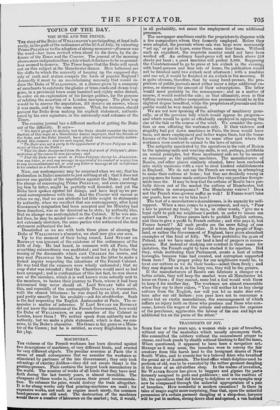TOPICS OF THE DAY.
THE DUKE AND THE PRINCE.
THE story ofthe Duke of WELLINGTON'S participating, at least indi- rectly, in the.guilt of the ordinances of the 25th ofJuly, by exhorting Prince POLIGNAC to the adoption of strong measures—firmness was the word—has. been revived when about to die down, by the de- fences of the Times and the Courier. The journal of the mornino- shows more indignation than a tale which it declares to be so ground.- less seemed to deserve. The Times hopes that the Duke will speak out on this subject at the Manchester dinner. How ludicrous are the shifts to which the necessity of keeping up the supposed dig- nity of rank and station compels the lords of popular England ! Assuredly it must be an overwhelming necessity that would in- duce the Duke of WELLINGTON, at a dinner given by a company of merchants to celebrate the glories of tram-roads and steam-wag- gons, in a provincial town some hundred and eighty miles distant, to enter on an explanation of his foreign politics, for the purpose of refuting the assertion of a London newspaper. The plain way would be to answer the imputation, if it deserve an answer, where it was made, and by the same means. What, for instance, should prevent the Duke from making his explicit statement, authenti- cated by his own signature, in the universally-read columns of the Times.
The evening journal has a different method of getting the Duke out of the difficulty. It says- " We feel it proper to declare, lest the Duke should consider the intro- duction of this topic at a Manchester dinner improper, that the friends of the Duke, and the Duke himself, have plainly and unequivocally contra- dicted this rumour ; and we now repeat, that " The Duke was not a party to the appointment of Prince Polignac as Mi- nister of Charles the Tenth ;
"That the Duke disapproved from the very first week of Polignac's Admi- nistration of the course he was pursuing; and "‘ 7 hat the Duke never wrote to Prince Polignac during his Administra- tion any letter, or sent any message in approval of his conduct or urging him to any unconstitutional act, or sent any letter or message at all in reference to his conduct as a French Minister."
• Now, our contemporary may be surprised when we say, that his declaration in Relies amounts to just nothing at all; that it does not answer one particle of the imputation against the Duke ; and that the charge of encouraging Prince POLIGNAC, and even encourag- ing him by letter, might be perfectly well .founded, and yet the Duke have spoken against hi S doings, and have kept hp no per- sonal correspondence with him. And the Courier will excuse uS when we say, that we can attribute but little weight to statements by authority, when we recollect that our contemporary, after Lord GODERICH'S resignation had been accepted and his Ministry. had been dissolved, was so far deceived as to state, by authority also, that no change was contemplated in the Cabinet. If he was mis- led then, he may be misled now—we don't say he is—for if we are not extremely mistaken, the same parties who authorized the,first statement authorized the last.
• Dissatisfied as we are with both these plans of clearing the Duke of WELLINGTON'S character, we shall now give our own. Up to the moment of their being issued, Lord STUART DE ROTHSAY was ignorant of the existence of the ordinances of the 25th of July. He had heard, in common with all Paris, that something extraordinary was meditated ; and but a day before the issuing of the documents which cost CHARLES his crown, and may cost POLIGNAC his head, he waited on the latter to make a formal inquiry respecting the intentions of the French Cabinet. He was told that the rumours were wholly unfounded ; that no coup detat was intended ; that the Chambers would meet as had been arranged ; and in confirmation of this last fact, he was shown one of the circulars, which it is well known were actually sent to the members, to hasten their journey to Paris, where it had been determined they never should sit. Lord STUART talks of all this, and especially of the contemptible POLIGNAC 'S tracasserie, with the utmost bitterness : he was duped by an idiot, and has paid pretty smartly for his credulity—ask his stockbroker. Such is the fact respecting the English Ambassador at Paris. The re- mainder is matter of inference. If Lord STUART DE ROTHSAY did not know the intentions of the French Government, how could the Duke of WELLINGTON, or any member of the Cabinet in London, know them ?- We neither speak from authority nor for Authority, but we make a plain statement, which is due, we con- ceive, to the Duke's character. His Grace is fair game as a Minis- ter of the Crown; but he is entitled, as every Englishman is, to fair I lay.


























 Previous page
Previous page